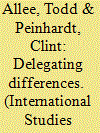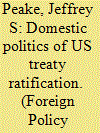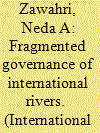|
|
|
Sort Order |
|
|
|
Items / Page
|
|
|
|
|
|
|
| Srl | Item |
| 1 |
ID:
095373


|
|
|
|
|
| Publication |
2010.
|
| Summary/Abstract |
Bilateral investment treaties (BITs) have become the dominant source of rules on foreign direct investment (FDI), yet these treaties vary significantly in at least one important respect: whether they allow investment disputes to be settled through the International Centre for the Settlement of Investment Disputes (ICSID). Through the compilation and careful coding of the text of nearly 1,500 treaties, we identify systematic variation in "legal delegation" to ICSID across BITs and explain this important variation by drawing upon a bargaining framework. Home governments prefer and typically obtain ICSID clauses in their BITs, particularly when internal forces push strongly for such provisions and when they have significantly greater bargaining power than the other signatory. Yet some home governments are less likely to insist upon ICSID clauses if they have historical or military ties with the other government. On the other hand, although host governments are often hostile toward ICSID clauses, particularly when sovereignty costs are high, they are more likely to consent to such clauses when they are heavily constrained by their dependence on the global economy. Our findings have significant implications for those interested in FDI, legalization, international institutions, and interstate bargaining.
|
|
|
|
|
|
|
|
|
|
|
|
|
|
|
|
| 2 |
ID:
159568


|
|
|
|
|
| Summary/Abstract |
Treaties represent an important policy mechanism in US foreign policy. There are good reasons to expect that the political process underlying treaty ratification in the United States is structured by the partisan political context, the policy context including the policy agenda, and, in the case of bilateral agreements, the relationship between the treaty partners. I analyze the duration of the ratification process for all bilateral treaties transmitted by the president to the Senate from 1949 to 2012. I focus the analysis on two key stages where delay is most common: the presidential transmittal stage and the Senate Foreign Relations committee stage. Analysis indicates that presidential resources, partisan polarization, the broader policy agenda, and the value of the treaty structure presidential decisions on treaty transmittal. I find less support for these factors at the committee stage; however, the committee processes treaties with democracies more quickly than treaties with other states. The results have important implications for US foreign policy.
|
|
|
|
|
|
|
|
|
|
|
|
|
|
|
|
| 3 |
ID:
106936


|
|
|
| 4 |
ID:
106935


|
|
|
|
|
| Publication |
2011.
|
| Summary/Abstract |
Water scarcity is popularly associated with inter-state conflict, yet the academic literature also touts scarcity as an important variable for understanding cooperation over international freshwater. Building on studies that consider the relationship between scarcity and hydro-political cooperation, this paper empirically investigates why water treaties are negotiated for some rivers and between some riparians, and not others. Rather than considering a linear relationship between scarcity and cooperation, this study hypothesizes a curvilinear relationship expecting agreements to emerge in situations where scarcity is moderate rather than very low or high. Additional variables considered for understanding treaty formation include level of governance among the riparian states, prevailing power dynamics along the river, overall inter-riparian relations (measured by trade, diplomatic ties, and militarized disputes), and the geographical configuration of the entire river. The hypothesized curvilinear relationship between water scarcity and cooperation finds significant support in the empirical analyses. Governance, diplomatic relations, and trade are likewise found to be salient in explaining the levels of cooperation. The geographical configuration of the river was significant in only part of the estimates, and the militarized disputes variable was found to be insignificant across all models. Finally, while results confirm that cooperation may not depend on power asymmetries within riparian dyads, as suggested by some theories, the paper does find support for the contention that more developed states are in a position to provide incentives, such as financial transfers, to less-developed states so as to facilitate an international agreement.
|
|
|
|
|
|
|
|
|
|
|
|
|
|
|
|
|
|
|
|
|